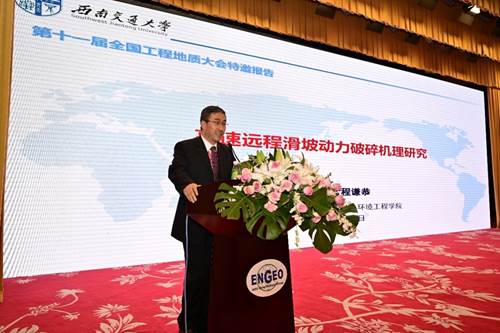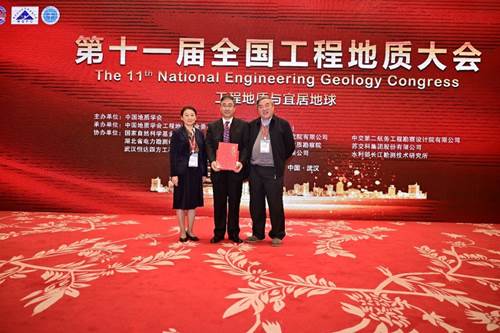On October 16 through October 18, 2020, the 11thNational Engineering Geology Congress, hosted by the Geological Society of China, organized by the Engineering Geology Commission of Geological Society of China and China University of Geosciences (Wuhan), and co-organized by 54 organizations including the National Natural Science Foundation of China, was held in Donghu Hotel, Wuhan, Hubei Province.The number of offline participants in the Congress was controlled due to the epidemic.Nearly 300 well-known domestic experts and scholars in engineering geology attended the offline congress, but thenumber ofconcurrent online participants exceeded 200,000 at peak time, with nearly one million cumulative clicks.
With the theme of "Engineering Geology and Livable Earth", there were 12 topics including "Engineering Geology and Global Change", "Prevention and Control of Major Engineering and Geological Disasters", "Rock and Soil Structure and Engineering Geological Characteristics", "Marine Engineering Geology and Coastal Zone Development", "Traffic Engineering Geology and Sichuan-Tibet Railway Construction", "Energy Engineering Geology and Underground Space Utilization", "Environmental Engineering Geology and Ecological Environment Protection", "Engineering Geology and Toughness Engineering Construction", "Artificial Intelligence in Engineering Geology", "Big Data and Cloud Computing", "New Theories, New Technologies and New Methods of Engineering Geology", and "Engineering Geology Education and Disciplinary Development".
Professor Cheng Qiangong, a member of the Engineering Geology Commission of Geological Society of China, delivered an invited lecture titled "Study on Dynamic Crushing Mechanism of High-Speed Long-Distance Landslide" in the Congress, in which he detailed the investigation and analysis of typical high-speed long-distance landslide on the Qinghai-Tibet Plateau in recent years by his team, and the results of the experimental research on the physical model of dynamic fracture of the high-speed long-distance landslide. The relationship between the rock mass structure of the source area of the high-speed long-distance landslide, the fragmentation process of the slip mass and the distance of the landslide movement was analyzed systematically, revealing the dynamic fracture mechanism of the high-speed long-distance landslide, which was highly appreciated by the participating scholars. The results of this research were listed as one of the seven major progress achievements in 2020 by the National Office of the Second Tibetan Plateau Scientific Expedition and Research (Task 9), which were reported at the Congress. At the closing ceremony, Researcher Qi Shengwen, SecretaryGeneral of the 11thEngineering Geology Commission, listed the dynamic fracture mechanism of high-speed long-distance landslide as a major progress in the frontiers of engineering geology discipline of China on behalf of the Engineering Geology Commission.
It is said that the research results have been listed as a highlight by the Office of the Second Tibetan Plateau Scientific Expedition and Research and have been publicized on the website of scientific investigation previously.







